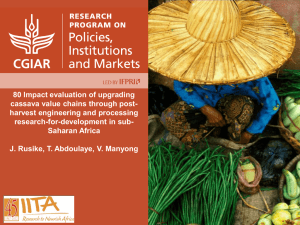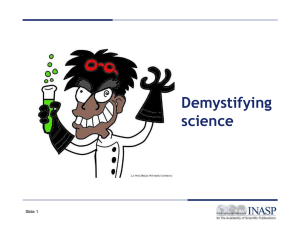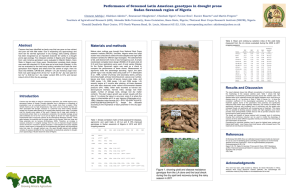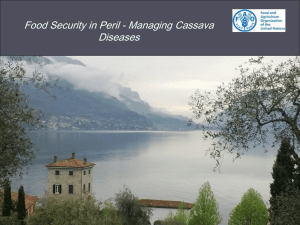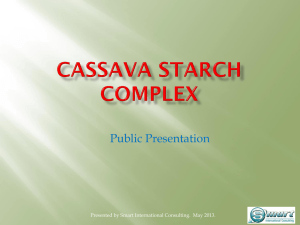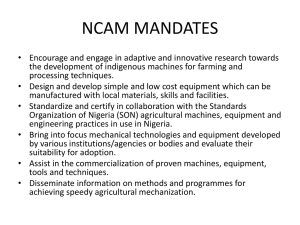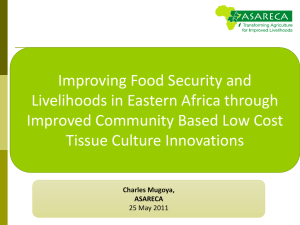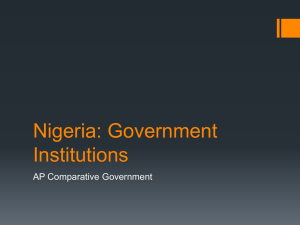Lobbying in Nigeria
advertisement
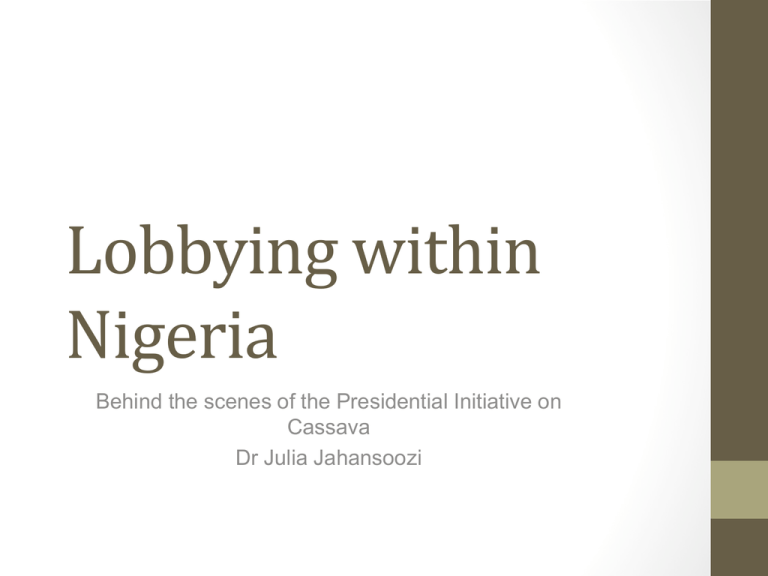
Lobbying within Nigeria Behind the scenes of the Presidential Initiative on Cassava Dr Julia Jahansoozi Introduction • Presidential Initiatives (PI) typically are grandiose endorsements relating to large scale politically motivated programmes • Often the purpose of a PI is to achieve behavioural change within the population • Across sub-Saharan Africa PI are invoked to increase mass awareness of a particular issue, which is perceived to be important for national economic and social development PIC • Within Nigeria the Presidential Initiative on Cassava (PIC) was the first of its kind and was launched in 2002. • It involved a number of key stakeholders who collaborated and lobbied President Chief Obasanjo to lend his support (in order to exploit untapped commercial opportunities linked to cassava beyond traditional uses) • Specific aims of the PIC: • Enhancing productivity and production of cassava via increased cultivation area • Producing 37.5 million tons of processed cassava annually for both internal and export markets • Generate US $5 billion annually from exporting value added cassava products Research outline: • This research explores the background lobbying and stakeholder engagement that took place preceding the launch of the PIC • The focus was to: • To explore how the Presidential Initiative on Cassava (PI) was lobbied for and developed within the Nigerian context • To identify and understand the involvement and experience of key individuals and stakeholder groups in the lobbying effort and development of a PI Literature review • Dearth of literature on lobbying practice in Nigeria • Lobbying within Nigeria shares similarities with the lobbying practice in Europe and the US as it is not completely accepted as an overt activity (McGrath, 2006, p.67) • Lobbyists are regarded as furthering hidden interests and operating in an opaque environment – more often referred to as experts who offer advice and access to decision makers • Lobbying is defined as being: • “…the timely, legal exercising of influence on political decisionmaking processes in order to assert particular economic interests, more specifically by means of information”/ (Müller & Zaugg, 2005, p.6) Other definitions • Lobbying: • “…a specialized practice that focuses on relations which will have a bearing on public policy…” (White & Mazure, 1995, p.182) • this definition covers the lobbying with the focus on relationships which are indeed critical for the practice • “… lobbying is influencing political decision making by communicating with publics relevant in the political process of a certain issue. These publics are the political decision makers and officials, competitors, mass media, and citizens.”(Jaatinen, 1998, p.25) • Whilst lobbying requires interpersonal, group and mass communication approaches, it is critical that the interpersonal relationships with decision makers exist in order for lobbyists to have access to them – which is why lobbyists are useful and employed! • Lobbyists may also facilitate the organization of associations that represent key stakeholders that otherwise might not be able to participate in the lobbying process Lobbying • Involves two-way asymmetrical communication when the purpose is to persuade the decision-makers or public to behave in a particular way (Jaatinen, 1998) • Involves two-way symmetrical communication if the decisionmakers or public are also able to influence the lobbyist/organization behind the lobbying activity (Grunig & White, 1992, pp.38-40) • Lobbying may also include mixed motivations such as furthering the interests of a particular group as well as benefiting the public interest – this approach is thought to include the characteristics of both two-way asymmetrical and two-way symmetrical communication (Grunig & Grunig, 1992, pp.311-312). Criticisms of lobbying practice • Unethical behaviour as lobbyists do whatever it takes to obtain a favourable outcome for their clients • Whilst ethical lobbying exists there are criticisms that some lobbying activity which might technically be legal is ethically questionable: • Paula Parkinson, an agricultural lobbyist, admitted to sleeping with eight US Members of Congress and also escorting three legislators on a golf trip which resulted in support for her client’s position regarding policy (1998, pp.98-99, cited in McGrath, 2006, p.68) Methodology and analysis • A phenomenological approach was adopted as I was interested in the lived experiences of key individuals directly involved in the development and lobbying of the PIC • A total of 22 in-depth face-to-face interviews were conducted in Nigeria • Interviews were open-ended allowing the interviewees to explain events from their own perspective/first hand experience and lasted between a minimum of 45 minutes to over 3 hours • Purposive interview sample included lobbyists/advisors, cassava scientists, agricultural advisors, civil servants, specialists in cassava commercialization, politicians, and representatives from the Cassava Growers Association • Interviews were transcribed and were coded for key themes, which were then grouped into broad thematic clusters and then reduced into overall clustered themes. Results • Participants discussed their lived experience and particular perspective gained from their role and involvement with the PI, how they became involved, who they thought were the key influencers in driving the PIC, what the successes and major constraints were of the PIC Themes • Overall clustered themes: • Development of the PIC • Key individuals / influencers • • • • • • • Key stakeholders/stakeholder relations Interpersonal relationships Collaboration Constraints Success stories Lessons learned Trust (lack of) Discussion • • • • • Development of the PI on Cassava (PIC) Importance of interpersonal relationships Constraints Successes Lessons learned for future PIs Development of the PIC • Key individuals were identified who were thought to be responsible for the development of the PIC: • President Obasanjo; Chief Dr Alfred Dixon (an internationally recognized leading cassava scientist who worked at IITA and is referred to as ‘the Father of Cassava’); Chief Adepomola (Chairman of the Cassava Growers Association); Boma Anga (key lobbyist); and Audu Ogbeh (Chairman of the Peoples Democratic Party (PDP)) • There were some differing perspectives regarding who was responsible, but in general these were the names that came up. Development of the PIC • Private sector lobbied President Obasanjo about the economic opportunities with regard to cassava – trip to Brazil and Columbia to see how these two countries were commercializing cassava (ethanol; industrial grade starch, animal feed, etc) • Led to President Obasanjo calling for an ‘emergency meeting of stakeholders’ which included private sector, agricultural research institutes, Cassava Growers Association, policy makers, ministers of agriculture, women’s affairs, finance, water resources in order to discuss the opportunity for developing value-added cassava products – dramatic change as this was the first meeting of its type and adopted a collaborative approach Development of the PIC • “previously the only ‘vision’ for cassava was one of food security for Nigerians, but now for the first time there was discussion around the potential of cassava as an engine for economic development as an export commodity” • Private sector put pressure on politicians who then saw the economic benefits it could have for Nigeria • Government wanted to diversify the economy away from petroleum dependency toward a market and production led economy Stakeholder engagement • For the PIC to be effective there needed to be an awareness of the issues that cut across the key stakeholder groups and platform was needed that would include all the stakeholders across the cassava value chain in order for issues to be addressed holistically and for cassava to be exploited for nontraditional uses such as glucose, industrial grade starch, and ethanol • “The Presidential Initiative was both a bottom-up and an updown arrangement that essentially brought all the stakeholders in the value chain from production, the producers, the private and public extension, people involved in seed multiplication and developing new varieties, distribution, policy, marketing etc…this initiative brought all the stakeholders together and created a mechanism to sell the vision for cassava transformation and development for the nation under a short and long-term framework and buying in everyone across the value chain” Influential interpersonal relationships • Many interviewees mentioned that President Obasanjo had an ongoing relationship with key individuals at IITA that spanned many years. • “…Obasanjo was a special advisor to IITA… so he knows IITA very well, what it was doing, the research, the output, so there is an open relationship…” • “Hartman [Director General, IITA] would go to President Obasanjo’s place every weekend…” • At one point (before becoming President) Obasanjo was a ‘special advisor’ to IITA and after becoming President he wanted to have IITA representatives present at relevant meetings • Having direct access to President Obasanjo meant that IITA could promote its research agenda and gain political support (namely good will) for its work on cassava (one of IITA’s mandated crops) Influential interpersonal relationships • Boma Anga, a key lobbyist/advisor representing private sector interests, was also the son-in-law of Audu Ogebeh, Chairman of the Peoples Democratic Party (PCP) – the party that was in power with President Obasanjo as its leader… Constraints • Opposition to the PIC by the Flour Millers Association due to the PIC including a policy on the inclusion of 10% of high quality cassava flour HQCF) being mixed with wheat flour for bread and confectionary baking • Previously this had never been a serious issue as there were numerous problems relating to the production of HQCF, however as the production problems were resolved the situation changed • “ the Flour Millers Association is a powerful lobby group and as a result they were not buying the cassava flour from the processors…” • “…they [Flour Millers] didn’t like the imposition of 10% of cassava flour to be included for bread and confectionary baking, also the US didn’t like it [as the biggest exporter of wheat to Nigeria] and they tried to find a way around it…” • “… naturally there will always be opposition especially when you talk of import substitution programmes, it means that you are displacing someone’s business, you are reducing their income…” Constraints • Whilst there were civil servants randomly checking the flour composition to ensure the addition of 10% HQCF had been included these civil servants risked getting killed as they were going against extremely powerful individuals… • One interviewee mentioned that there were ‘untouchables’ within FMA who could influence things despite President Obasanjo’s will and policies – which was why an import tariff on wheat was removed making imported wheat cheaper than casava flour (which had a huge impact on the cassava sector) • There was also a level of jealously relating to IITA’s relationship with both President Obasanjo and major grass roots organizations • Internal politics: civil servants within the Ministry of Agriculture took exception to an international organization (IITA) running the cassava programme within their country and were also jealous of the ‘favoured’ status IITA had with President Obasanjo Successes • Interviewees mentioned a number of successful outcomes from the PIC that were very positive: • Investment in agriculture increased dramatically • Involvement of private sector was viewed as being crucial for the survival of the PIC beyond President Obasanjo’s term in office • Awareness of cassava increased within Nigeria as well as externally (world markets) – Nigeria became the world’s biggest producer of cassava • New cassava varieties were developed (by IITA) that made a difference in terms of nutritional value and also for commercialization • The development of organizations across the cassava value chain such as the Cassava Growers Association, the National Association of Cassava Exporters, the Cassava Equipment Manufacturer Association, the Cassava Equipment Fabricators, etc – and led to collaboration and problem solving at a level that had not existed prior to the PIC Lessons learned • Interviewees mentioned that if they could re-live the PIC they would have pushed for the PIC to be legislated to ensure its sustainability beyond Obasanjo’s presidency • Many interviewees said they would also have spent more time developing dialogue with key stakeholders and strengthening public–private partnerships so the initiative could have been driven by the private sector Conclusion • Conclusion • Lobbying in Nigeria is not that different but it is different due to cultural factors (as you’d expect…) • Bringing together influential stakeholders created momentum to drive the PI • Inclusive approach encouraged participation • PI taken on board by the private sector which continues to invest in cassava commercialization despite the regime change Questions??
